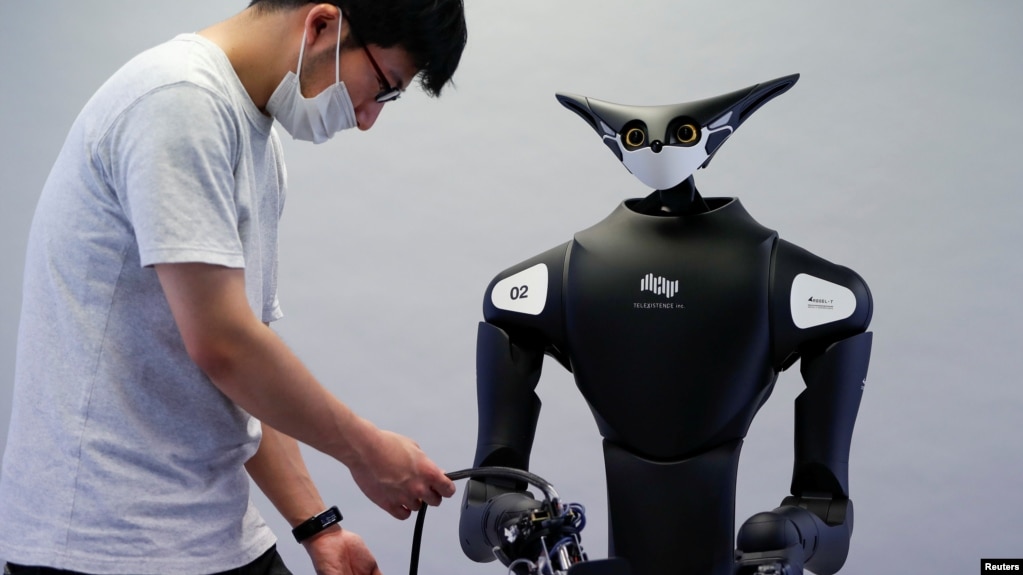近未来じゃない、ロボット作業員のリアル
未来の生活を描く時、必ず登場する、空飛ぶ乗り物に家庭用ロボット。
そんな生活がやってくるのですね、もう少し見ていたい未来が現実となる日を。
遠くもあり、近いものでもあるのでしょう。
時計で何でもできる今、宇宙旅行を企画する今。
驚きのITの進歩、AIとの共存。
そしてアレクサに話しかける私。「ジャズをかけて」
今日のVOAニュース、日本の話題です。
日本の店舗がロボット作業員のテストを実施
Japanese Stores Test Robot Workers
8月、日本でもロボットが店舗の棚に食べ物や飲み物を置く作業が始まります。これは、ロボットのメーカーが小売店に自動化の波を起こすのに役立つと期待しているテストです。自動化とは、一部の仕事に人間の代わりにロボットやコンピューターを使うこと。
ロボットワーカーのメーカーは、東京都に本社を置くテレイグジスタンスという会社です。
テストを受けて、店舗運営会社のファミリーマートは、2022年までに東京都内とその周辺の20店舗でこのようなロボットを使用する計画だといいます。
ファミリーマートの競合他社には、小売チェーンのローソンがあります。テレイグジスタンスによると、同社は9月に最初のロボットのテストを行う予定だといいます。
最初は離れた場所から人がロボットを操作します。機械の人工知能(AI)が人間のような動きを真似ることを学習できるようになるまで、これらの操作を続けると語ってくれました。
ロボットメーカーの富岡仁社長。冨岡氏は、この技術によって、人は自分のいる場所以外の場所を感じ、体験することができると指摘します。
「人間の存在の範囲や規模を広げることができるのです」と彼は話します。
テレイグジスタンスと呼ばれるこのアイデアは、同社の共同創業者である東京大学教授の舘進氏が約40年前に提唱したものです。
テレイグジスタンスは、そのロボットをフォード・モーターの名車にちなんで モデルT と呼んでいます。フォードのモデルTは、今から約100年前に大衆車の時代を築きました。
このロボットは、オーストラリアの動物、カンガルーに似ています。珍しいデザインは、人に安心感を与えることを目的としています。人間に似すぎたロボットに不安を覚える人は少なくありません。
工場からの脱出
ロボットはまだ人前に出ることは稀で、予想外の状況で単純な仕事に苦戦しています。
この問題を解決すれば、一部の国、特に高齢化が急速に進んでいる日本では、より少ない労働者での対応が可能になるかもしれません。また、コロナウイルスの被害を受けた企業は、より少ない人数で業務を行う必要があるかもしれません。
コロナウイルスの危機が始まって以来、ホテル、レストラン、石油会社までもがテレイグジスタンスに連絡してきた、と富岡氏は言います。
原田仁紀さんは日本のレストラン労働組合の職員です。「ロボットがレストランにどのような影響を与えるかは、今はわかりませんが-それは、より少ない人々を意味することができますが、それはまた、新しい仕事を作成することもできるのです」と原田氏は言います。
ファミリーマートではロボットを操作するために人が必要になりますが、オペレーターはどこにでもいることができるのです。オペレーターは、通常は店舗では働かないような人でも構わないと、ゼネラルマネージャーの加納智弘氏は言います。
「様々な理由で労働力として活躍していない人が日本には約160万人いるのです 」と。
金出武夫氏は、米カーネギーメロン大学のAI・ロボット科学者。同氏は2月にテレイグジスタンスにアドバイザーとして入社しました。
将来的にはテレイグジスタンスのロボットが病院で使われ、医師が離れた場所からでも手術ができるようになる可能性があるのです、と同氏は言います。
しかし、人の家でロボットが働けるようになるまでには、あと20年はかかるかもしれない、と金出氏は付け加えています。
「ロボットが家庭で本当に使えるようになるためには、コミュニケーションができるようにならなければなりません。」と、彼は言っています。
Telexistence株式会社
自動走行車、作業ロボ、空飛ぶ車、着実に私がこどものころ描いた未来は実現圏内に。
さらには
人間の脳内にAIを、という試みもなされています。
科学者のみならず哲学者さえも目を輝かせて賛同するこの動き、私には神への挑戦のように感じます。
もちろん神なる存在を信じる者ではありませんが、そんな私でさえ神の領域を制圧しようという人類の野望と写ります。
どこまで完璧を求めればいいのでしょうか。なぜ完璧でなければならないのでしょうか。
地球資源を吸い尽くし、破壊し、宇宙を制圧し、火星へ生き延びようととする人間はなんと恐ろしい生きものなのでしょうか。
あなたはどう考えますか?
Japanese Stores Test Robot Workers
In August, a robot will begin placing food and drinks on store shelves in Japan. This is a test that the robot's maker hopes will help create a wave of automation in retail stores. Automation is the process of using robots or computers, instead of people, for some jobs.
The manufacturer of the robot worker is a Tokyo-based company called Telexistence.
Following the test, store operator FamilyMart says it plans to use such robots at 20 stores in and around Tokyo by 2022.
One of FamilyMart’s competitors is the retail chain Lawson. That company will be testing its first robot in September, according to Telexistence.
At first, people will operate the robots from a distance. These operations will continue until the machines’ artificial intelligence (AI) can learn to copy human-like movements.
Jin Tomioka is the robot maker’s chief executive. He noted how the technology lets people sense and experience places other than where they are.
“It advances the scope and scale of human existence,” he said.
The idea, called telexistence, was first proposed around 40 years ago by the company’s co-founder, University of Tokyo professor Susumu Tachi.
Telexistence calls its robot the Model T, after the famous Ford Motor car. The Ford Model T began the era of mass car use around 100 years ago.
The robot looks somewhat like an Australian animal -- a kangaroo. The unusual design is meant to help people feel at ease. Many people feel uneasy around robots that look too human.
Escaping factories
Robots are still a rare sight in public. They also struggle with simple jobs in unexpected settings.
Solving that problem could help businesses in some countries, especially those in rapidly aging Japan, deal with fewer workers. Businesses hit by the coronavirus may also need to operate with fewer people.
Since the coronavirus crisis began , hotels, restaurants and even oil companies have contacted Telexistence, Tomioka said.
Niki Harada is an official at Japan’s Restaurant Workers Union. “It’s difficult to tell now what impact robots might have in restaurants - it could mean fewer people, but it could also create new jobs,” Harada said.
Although FamilyMart will still need people to control its robots, operators can be anywhere. The operators can also be people who would not normally work in stores, said Tomohiro Kano, a general manager.
“There are about 1.6 million people in Japan, who for various reasons are not active in the workforce,” he said.
Takeo Kanade is an AI and robotics scientist at Carnegie Mellon University in the United States. Kanade joined Telexistence in February as an adviser.
Future telexistence robots could be used in hospitals so doctors could perform operations from a distance, he said.
However, he added, it might take another 20 years before robots can work in people’s homes.
“In order for robots to be really usable at home,” he said, “we really have to be able to communicate."
_____________________________________________________________
Words in This Story
shelf – n. a flat object which is connected to a wall, and on which other objects can be placed
retail – n. the business of selling things directly to customers for their own use
chain – n. a group of stores or businesses owned by the same company
according – adv. as stated by or in
artificial intelligence – n. the development of computers with the ability to do things that normally require human intelligence
scope – n. the area that is included in or dealt with by something
scale – n. the size or level of something especially in comparison to something else
era – n. a long time or period of history
rapidly – adj. very quickly
impact – v. to have a strong effect on someone or something
Japanese Stores Test Robot Workers
 A staff member of Telexistence checks the company's shelf-stacking avatar robot, designed to resemble a kangaroo and developed to work in a convenience store in Tokyo, Japan July 3, 2020. (REUTERS/Issei Kato)
A staff member of Telexistence checks the company's shelf-stacking avatar robot, designed to resemble a kangaroo and developed to work in a convenience store in Tokyo, Japan July 3, 2020. (REUTERS/Issei Kato)